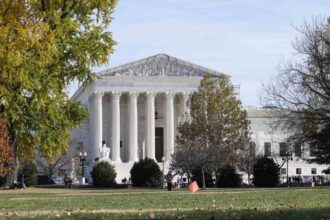Federal Reserve Governor Lisa Cook has launched a lawsuit against President Donald Trump, contesting his attempt to remove her from office in a case that could set a historic precedent for the Federal Reserve’s political independence.
In over a century of the Fed’s existence, no president has ever attempted to fire a governor until Trump announced Cook’s dismissal in a letter posted on his Truth Social platform late Monday. The statement alleged that Cook had engaged in mortgage fraud in 2021, prior to her appointment to the board.
The Supreme Court has previously signaled that the president cannot dismiss Fed officials over policy disagreements but may do so “for cause,” typically defined as misconduct or neglect of duty.
However, most legal experts argue that such removals require a formal process that gives the official an opportunity to respond. To date, Cook has not been charged with any crime.
Cook’s lawsuit seeks to overturn the unprecedented dismissal, highlighting concerns that Trump’s move undermines the Federal Reserve’s independence, a cornerstone of U.S. monetary policy.
The dispute comes amid escalating tensions between Trump and the central bank. He has repeatedly criticized Fed Chair Jerome Powell and other policymakers for not cutting the benchmark interest rate—currently at 4.3%—fast enough to stimulate the economy.
Last year, the Fed reduced rates by a full percentage point, and Powell recently signaled that further cuts are likely at the upcoming meeting on September 16-17.
Critics argue that Trump’s actions suggest a political motive. By attempting to remove Cook, he could create an opening to appoint a loyalist committed to his stance on lower interest rates. Trump has publicly stated that he will “only appoint people to the Fed who will support lower rates.”
The legal battle could have far-reaching consequences for both financial markets and U.S. monetary policy. Investors are closely watching whether this case disrupts the stability of the Federal Reserve Board, which plays a critical role in managing inflation, economic growth, and banking regulation.
If successful, Cook’s lawsuit may reaffirm the independence of the Fed, while a loss could give presidents greater influence over monetary policy, potentially politicizing interest rate decisions.












